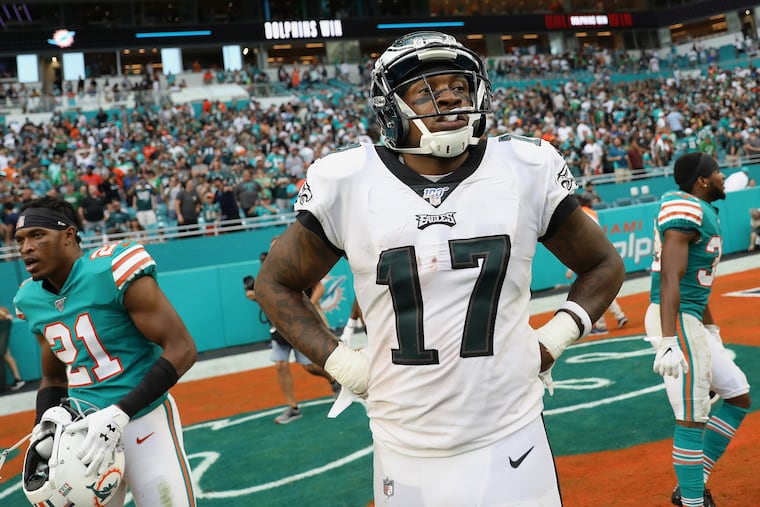Alshon Jeffery was the perfect mercenary for the Eagles. He got what he wanted. You did, too. | Mike Sielski
The relationship between the receiver and the Eagles and their fans has been transactional from the start. He got his money. Everyone else got a Super Bowl.

Alshon Jeffery was the perfect NFL mercenary for the Eagles. If they are able to release him or trade him, even as he convalesces from the Lisfranc injury that might prevent him from playing until the start of the regular season, that would be fine — in their minds and, I suspect, in his. If they bring him back because his unwieldy contract makes it too difficult to cut ties with him, well, that will be fun, too, given the iciness between him and Carson Wentz. Either way, there should be no complaints from Jeffery, from the Eagles, or from the team’s fans. This has been a fulfilling and worthwhile relationship for all sides, regardless of when and how it ends.
It’s unlikely to end on warm and fuzzy terms, of course. When WIP radio host and Eagles sideline reporter Howard Eskin pointed his Super Bowl-ring-clad finger at Jeffery as the source of the anonymous anti-Wentz backbiting that seeped out of the locker room last season, it did more than confirm what everyone around the team already suspected. It cast Jeffery as the worst kind of football rat, the kind who would speak in less-than-complimentary terms about the franchise quarterback. It didn’t matter that Jeffery’s alleged criticism of Wentz — that the Eagles should simplify the offense and that Wentz should check down more — was relatively tepid. Or that players talk to reporters off the record or on background about their teammates all the time. Or that it’s the height of naivete to think that all players in every NFL locker room, including the starting quarterback and one of his top wide receivers, are the best of buddies.
No, what mattered most was the timing of the hubbub. Sure, it shattered the popular perception that the 2017-18 Eagles were one big, happy, Meek Mill-listening, dog-mask-wearing, Mummers-outfit-stylin’ family. But more importantly, it came during a season in which Jeffery played just 10 games, caught just 43 passes, and seemed a step slower with each passing week. It provided the Eagles one more reason to head in the direction they were planning to go anyway: They’re doing everything they can to create an environment in which Wentz can feel comfortable and thrive. Not only isn’t Alshon as productive as he used to be, but he and Carson don’t even like each other! If Jeffery’s apparent disloyalty to Wentz and the Eagles makes it easier for Howie Roseman to justify eating a chunk of salary-cap space for the sake of jettisoning Jeffery and bringing in a younger, faster wide receiver, Roseman won’t bemoan the trade-off.
Jeffery won’t, either. There always will be a measure of sentimentality attached to every member of the first Eagles team to win a Super Bowl, and that team might not have won that championship without Jeffery. He caught nine touchdowns during the regular season, then three more in the NFC Championship game and Super Bowl LII, playing the entire season with a torn rotator cuff. But understand: Jeffery never has hid the fact that he generally has approached his entire career, even his tenure with the Eagles, from a business perspective first and foremost.
He signed a one-year contract with the Eagles during the summer of 2017, betting that he would earn a longer, more lucrative deal down the road. So he played through the pain in his shoulder, and 12 games into that season, the Eagles rewarded him with a four-year extension. Then they restructured that contract again last summer, guaranteeing his salary this year.
Is it too much to call Jeffery a gun-for-hire? Remember: This is a guy who made a calculated choice to pursue pro football instead of pro basketball, even though he preferred and arguably was more skilled in the latter sport. Basketball was his love. Basketball was his passion. But football was, to him, the surer route to millions of dollars, to financial security for himself and his family. He could try to reach the NBA as a 6-foot-3 point guard, or he could try to make the NFL as a 6-foot-3 wide receiver. In one of those professions, Jeffery would have been a longer shot. In the other, he would have, and throughout his career has had, a physical advantage over many, if not most, of his opponents. He was practical about the decision.
“Hey, man, it’s easier to get to the NFL,” he said in an interview before the 2017 season. “Nowadays, I wish I would have stuck with the NBA, with the money they’re giving out.”
Then he smiled a gigantic smile. Football was and has been and remains a job to him, one that he can do anywhere. He has done it with the Eagles for three years, and it resulted in a Super Bowl for the city and a measure of wealth that, to Jeffery, validated his course of action. This has been a transactional relationship from the beginning, and it was always going to be. Alshon Jeffery got what he wanted. The Eagles and everyone else did, too. It might just be time to leave it at that.